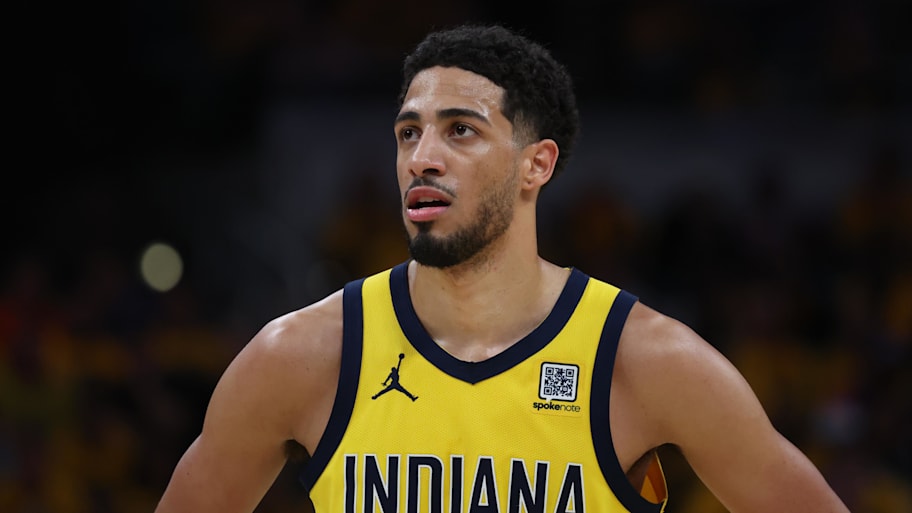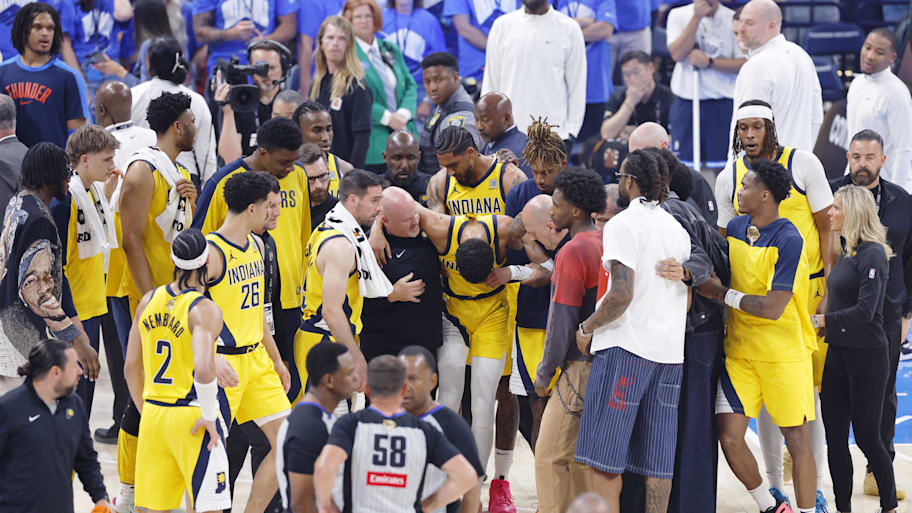
Last week, during an exhibition game against Oklahoma City, Indiana Pacers guard Johnny Furphy muscled his way past a Thunder defender and slammed home a backboard-shaking tomahawk dunk. When Furphy landed, he paused to stare at the Indiana bench. Among the first players off it: Tyrese Haliburton, who had leapt to his feet in approval.
For Haliburton, the reaction was genuine. It has been four months since the All-NBA guard collapsed in Game 7 of the NBA Finals, his Achilles tendon ruptured. What followed—Indiana’s loss, his subsequent surgery, the months he spent immobilized, spending untold hours playing the latest WWE video game—was difficult. But he has emerged on the other side of it. “You try to move on the best you can,” says Haliburton. “But it hasn’t been easy.”
Haliburton is connected through a video call from Indianapolis, where he is promoting the second season of Netflix’s Starting 5, which followed five players—including Haliburton—through the 2024–25 season (the series debuts on Thursday). The spotlight wasn’t always comfortable (“My mom hates cameras,” says Haliburton), but Haliburton emerged from it grateful to have documented his most complicated season.
Consider: Some of the early footage was shot in late November, during an in-season tournament game against Milwaukee. Back then, Haliburton says, “I was in a dark place.” The social media clowning Haliburton took for his limited role in USA Basketball’s gold medal–winning run had taken a toll on him. His body was banged up going into training camp and, Haliburton says, “My joy for basketball just wasn’t there.” His shooting numbers cratered. The irrational confidence he once played with was gone.
“And I’m just such a guy who, basketball, I love the game,” says Haliburton. “I love basketball. I feel like I’m going to be around basketball for the rest of my life. I am just one of those guys, and [the joy] just wasn’t there.”
Therapy has been a useful tool for Haliburton. Last fall, the Pacers hired Dr. Jaimie Rubin as director of sport psychology and team wellness. As his mental health spiraled, Haliburton met with Rubin and Indiana coach Rick Carlisle. His message: I’m not O.K.
“It just took me to come out and say, ‘I know you guys are doing your best to look out for me, try to have conversations about basketball, but I’m just not O.K. in life, and I need to tell you guys that just so I can speak through that and let’s work through what is going to be the best route for me.’ How can I get to where I need to be? Should I take some time where I’m not there so I can get my mind right? What is it going to be?
“For me, it’s like there’s a lot of different things that went into it, but we obviously ultimately got out of it and moved on. But yeah, I think a lot of it was just me mentally, I just wasn’t in a good spot, and I’m really thankful for the people around me, my family, my loved ones, sports therapists, Coach Carlisle and the staff, teammates. I got through that and I’m really thankful for it and proud of myself for getting through that and ultimately having the year I had.”
And what a year. Haliburton’s numbers stabilized in the second half of the season. He averaged 20.6 points after the All-Star break, shooting 43.9% from three. Before the playoffs, The Athletic published a poll, voted on by NBA players, ranking Haliburton as the league’s most overrated player. He responded by submitting one of the most clutch postseasons in league history, highlighted by four game-winning—and one memorable, Reggie Miller–recalling game-tying—shots.
In Game 7, the pendulum swung back. Haliburton got off to a hot start, racking up nine points in seven minutes. Midway through the first quarter, his Achilles gave out. Indiana hung in for a while, even squeezing out a one-point lead at halftime. But without Haliburton, the Pacers couldn’t match Oklahoma City’s firepower, eventually losing by double digits.
Inside Indiana’s locker room, Haliburton was devastated. But the words from the Pacers training staff stuck with him. “The first thing they said is, ‘We got you. Don’t worry. We’re going to get you right back. I promise you, you’re going to come back the same. If not the same, better.’ And I believe them when they tell me that because I’ve been through some stuff, I’ve had some injuries and they’ve been there every step of the way. I trust those guys fully.”

What gnawed at Haliburton was the opportunity missed. It had been more than two decades since Indiana had advanced to the Finals. The entire postseason had been a storybook. Knocking off an ex-champ in Milwaukee. Taking out the top-seeded Cavaliers. Winning two straight at Madison Square Garden en route to a six-game conference finals win over the Knicks. And with a chance to punctuate it, everything fell apart.
“I think the grief for me is Game 7,” says Haliburton. “That was what I grieved more than anything, that game, that moment, and really that series. It was really hard for me after to not think about Game 2, Game 4, Game 5. Because if something would’ve changed in that game for us to win, I would’ve never been in that situation. You know what I mean? You can’t play that game necessarily because you will drive yourself crazy, you’ll never know, but I think that’s what I really dealt with early.
“And I think even when I got hurt, when I was overcome with emotion, it was more about that game and the championship. Because I know, I have the utmost faith that I’m going to come back and be better and be able to get right back and do the same things I was doing before the injury. I have no doubt about that. I think a lot of the grief for me was the series itself, the championship, because it felt like it was right there.
“And I don’t think I’ll ever be over it, if I’m being honest. I’ll never be fully over it and just be able to move on. It’s really hard, but the plan and the goal in life is to get right back there and obviously reach the mountaintop. So I know it takes some time, but I definitely still have days and nights and moments where I think a lot about that series, so that’s what I think I grieve more than anything.”
Recently, Jayson Tatum, who tore his Achilles six weeks before Haliburton, released a video showing him going through a hard workout. Haliburton loved it. Haliburton is in regular contact with Tatum—the two share the same skills trainer, Drew Hanlen—and while he’s not ready to put out his own sizzle reel, he insists his progress “is not far off.” He’s running and jumping. “Doing a little bit of everything,” says Haliburton. Tatum, he says, has been “a great person to lean on” as both go through this unexpected journey.
The months ahead will be difficult. Haliburton has to go back to middle school to remember a time he didn’t play for this long. The process of relearning how to walk and run has been tedious. He’s committed to working on his body and believes when he is ready to return, the work will make a difference. And as painful as the ending to last season was, he’s happy to have documented it.
“I’m glad that that’s going to live forever on a platform like Netflix,” says Haliburton, “to where hopefully one day, my kids and people who are able to see that and relive that and remember what that was.”
More NBA on Sports Illustrated
Listen to SI’s NBA podcast, Open Floor, below or on Apple and Spotify. Watch the show onSI’s YouTube channel.
This article was originally published on www.si.com as Social Media Trolling Took the Joy of Basketball From Tyrese Haliburton.







